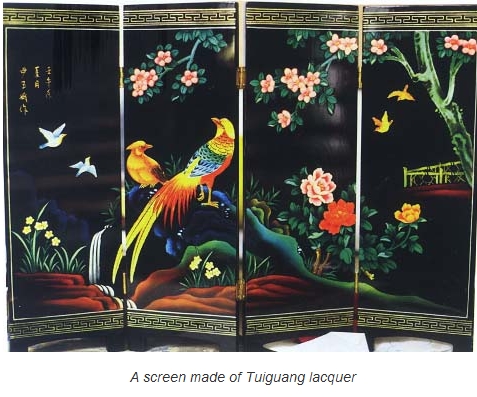Pingyao is an old city with a history of more than 2,700 years in Shanxi Province. Despite the turmoil in the changing dynasties, it has remained a county seat with the most complete features of the Ming and Qing dynasties. In 1997, the United Nations Educational, Scientific and Cultural Organization (UNESCO) listed Pingyao as a World heritage Site.
This ancient city boasts "three unique things" for which it is famous: its old walls, beef, and Tuiguang lacquer. Tuiguang, a hand-polished lacquer, is one of four renowned lacquers of China and an old handicraft with a history of over 1,200 years. It is elegant and gorgeous with bright colors and displays its aged charms to the world, alongside the towering city walls, deep and serene courtyards, and ancient temples.
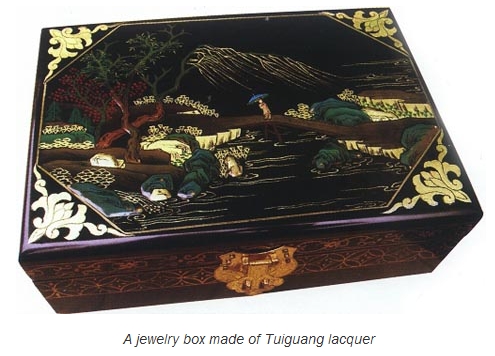
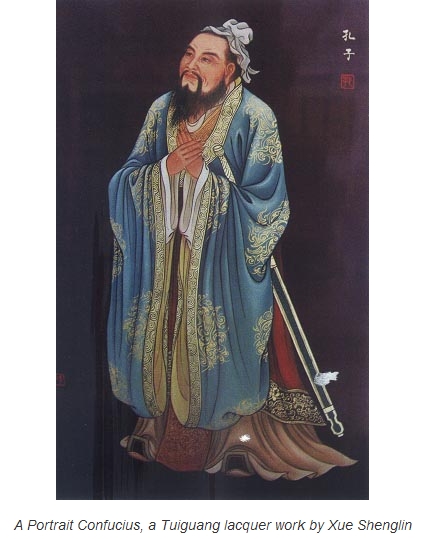
Pingyao is located in the ancient land known today as Shanxi Province. It was first built in the period of King Xuan of the Western Zhou Dynasty (827-782 BC) with loam walls. The brick and stone city walls of today were rebuilt in 1370, the third year of Emperor Hongwu of the Ming Dynasty.
Pingyao is an exquisite work in the shape of the Eight Diagrams, or the pattern of a turtle shell. There are six gates in the city walls. The south gate is the head of the turtle, the north gate is the tail of the turtle and the four gates of the east and west sides are the four feet of the turtle. In addition, there are 3,000 crenels and 72 battlements, which attest to the fact that Confucius had 3,000 students, of whom 72 were saints, at the time he was touring the various states to give lectures.
Upon entering the streets and lanes of Pingyao you can see shops of Tuiguang lacquer of all sizes everywhere. These shops are mostly traditional structures of earth and wood with ancient simplicity and elegance. However, once you enter the shops you'll see a riot of colors and a stunning array of collections. The various Tuiguang lacquerware- the large ones such as screens and furniture and the small ones like decoration paintings and pictures, jewelry boxes, etc.-- are all colorfully dazzling, tempting visitors to buy them.
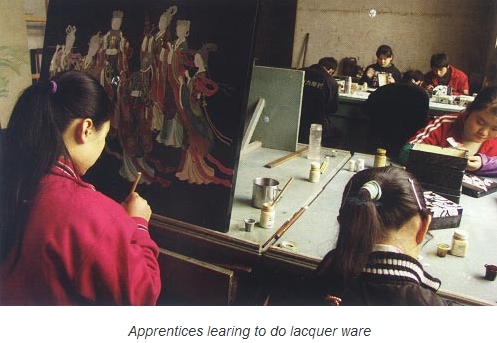
Tuiguang lacquer originated in the Kaiyuan period (713-741) of the Tang Dynasty and rapidly developed its local features in the Ming and Qing dynasties. It has a clean, bright surface, which is reflective like a mirror, and is heat-and moisture-resistant. In fact, Tuiguang (literally meaning "push smooth" ) lacquer is an industrial process. Its name is derived from the fact that its luster is achieved by hand polishing.
The workmanship of the lacquerware is unique with the five processes of wooden-base making, the grey-base process, lacquer application, painting, and inlaying. First, the wooden bases of various kinds of furniture are made; then comes the process of making the grey bases, using white hemp to wrap the wooden bases and then spreading on a layer of plaster mixed with pig blood. They are coated with a base lacquer that is mainly ink-black, sunglow red, apricot yellow and greenish purple, and finally coated with a natural lacquer. Each coat of lacquer must be scrubbed with abrasive paper dipped in water and then repeatedly rubbed by hand. Lacquer is applied again when it feels smooth. Normally six or seven coats of lacquer are needed. Hand rubbing is meticulously done with watered abrasive paper, cotton cloth, silk, and satin, with the hand dipped in sesame oil until the lacquer face shines reflectively. The painter needs a high professional level to create pictures. Inlaying involves processing freshwater mussel shells, mother-of-pearl, ivory, and colorful stones into various kinds of elements and then arranging them on the lacquerware, according to the artist's design.
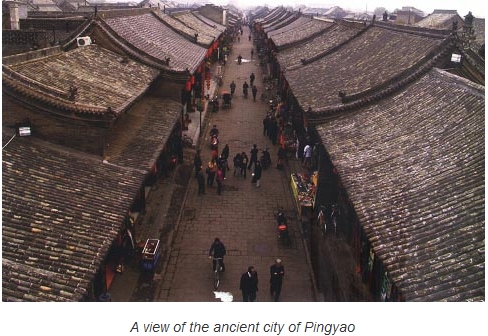
After being hand polished and painted with colorful hues and gold, the polished lacquerware feels fine and smooth, reflecting images like a mirror, and the designs of landscapes, human figures, birds and animals, pavilions and pagodas, and rare flowers and plants glisten.
A true artist of the process of polished lacquer is not only required to command consummate skill but also have considerable cultural knowledge and artistic attainment, and not only make pictures based on others' works, but, more important, should have his own creative ideas. At present, the lacquer artist with the highest seniority in Pingyao is Xue Shengjin. Born in 1937, he has not only grasped the polished lacquerware-making skills comprehensively, but also has a high knowledge of traditional culture, capable of creating original designs and making lacquerware without referring to any designs or paintings. In more than 40 years of his career he has restored and developed the art of making lacquerware, which had been on the verge of extinction. He did this step-by-step and formed the lacquerware art of the "Xue"school, which is unique to Pingyao.
The existing varieties of polished lacquerware of Pingyao are screens, hanging panels, wardrobes, display cabinets and jewelry boxes. The local people are proud of owning several pieces of refined, polished lacquerware of high distinction. In the house of Master Xue Shengjin, beautiful and elegant polished lacquerware can be found everywhere, and even the cupboards in the kitchen are colorful and painted gold, full of artistic and cultural flavor. In Pingyao, a young woman needs several pieces of superb, polished lacquerware as part of her dowry; otherwise, she will lose face.
